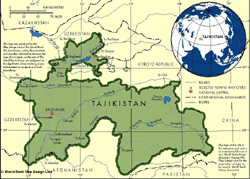In honor of Dushanbe's hosting of tomorrow's Shanghai Cooperation Organization 2008 summit, we should discuss the current state of the nation, its struggles and prospects. To help me do this I will use another one of Johannes Linn's, executive director of the Brookings Institution's Wolfensohn Center for Development, pieces he wrote while visiting the region a month ago. Tajikistan is obviously a state with much geographic importance, bordering China, Afghanistan, Pakistan, being a hub for the transport of extremists into Afghanistan and a hub for getting narcotics out of the nation, and as a former Soviet state it takes on new significance in the light of the Georgia-Russia conflict (you may have heard, former Republican presidential candidate Mitt Romney stated the word 'soviets’ instead of Russia, not once, but twice when speaking to reporters at the Democratic Convention, a slip up or a coming Cold War II, you decide!). Tajikistan also has grown diplomatically in recent years and finds itself in a greater amount of international and regional groupings, garnering greater international aid and assistance.
 Let us first go over what Linn sees as Tajik's main problems or possible upcoming crises:
Let us first go over what Linn sees as Tajik's main problems or possible upcoming crises:
1. Economic Crisis – Linn blames poor economic management by President Rakhmon's government, regional factors such as disputes over energy transfers, and international trends (rising food prices and global warming) for the recent troubles facing the nation and its citizens economic picture. This of course was made visible during the past horrific winter, which in many ways brought the nation to a standstill.
2. Political Instability – Though less visible, says Linn, the deteriorating economic situation and quality of public services are causing the nation's citizenry to question Rakhmon and his political elites ability to govern effectively. Though he rightly believes, that an uprising or ‘color’ revolution, as was the case in Kyrgyzstan, is far from happening, a more likely outcome would be an internal battle between political elites for control of the state, which we have discussed here. Either way, instability would ensue, creating a myriad of problems to this already poor nation.
3. International Perception – Linn worries that these above potential crises could damage Tajik's image further with international and regional donors and scare off foreign investors, two sectors which could provide vital resources for the state
It is not all bad news in Tajikistan, however. Linn highlights the government's following of a new IMF plan to deal with their macroeconomic structural problems, the fact that international aid groups are sticking around around to help with the possible upcoming crises, and the new presence of Russia and China's as aid donors, ready to engage with the traditional/Western donors. Still, the Rakhmon and international and regional donors and groups have much work to do to solve this nation's myriad problems. Linn spot on argues that Rakhmon's government needs to open itself up more to market-driven economic measures and restructuring, show more effective management in times of crisis, and create conditions for a more transparent and therefore accountable government. External donors, including Russia and China, need to stay committed to solve the nation's problems, and regional groupings need to get together to start effectively dealing with the water and electric energy issues facing the region as a whole. (Linn has written two more pieces in this series dealing with the region's dire water and energy situation, I will discuss them at a later date, The Upcoming Water-Energy-Food Crisis Risks in Central Asia: Update on an International Response and Central Asia's Energy Challenge: Overcoming the Natural Resource Curse.) Tajikistan has other issues, drug trafficking, Afghan-Pakistan regional instability, and the dance it must perform when dealing with the great powers from its west, east, north, but these economic and energy issues need to be dealt with as soon as possible if this nation is going to progress in any meaningful way.
Tajik's Ambassador to UK
For the first time in its history, Tajikistan now has an ambassador in the United Kingdom. Here is an interview with Erkin Kasymov. It is interesting to see how safely he must field questions regarding the Russia-Georgian conflict and about China and Uzbekistan's treatment of Muslims. Hopefully this diplomatic seat can help bring the nation benefits in many of key areas just discussed.
(Photo Source: The Brookings Institution)